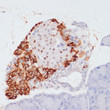| Post Translational Modifications | Phosphorylated by PKA and GSK3 in a sequential manner.phosphorylation results in activation of its activity. Phosphorylation on Thr-447 and Ser-451 depends on the phosphorylation state of Ser-455. Phosphorylation on Ser-455 is decreased by prior phosphorylation on the other 2 residues. Phosphorylated at Ser-455 by BCKDK and dephosphorylated by protein phosphatase PPM1K. ISGylated. Acetylated at Lys-540, Lys-546 and Lys-554 by KAT2B/PCAF. Acetylation is promoted by glucose and stabilizes the protein, probably by preventing ubiquitination at the same sites. Acetylation promotes de novo lipid synthesis. Deacetylated by SIRT2. Ubiquitinated at Lys-540, Lys-546 and Lys-554 by the BCR(KLHL25) E3 ubiquitin ligase complex and UBR4, leading to its degradation. Ubiquitination is probably inhibited by acetylation at same site. BCR(KLHL25)-mediated degradation of ACLY promotes fatty acid oxidation and is required for differentiation of inducible regulatory T (iTreg) cells. |
| Function | Catalyzes the cleavage of citrate into oxaloacetate and acetyl-CoA, the latter serving as common substrate for de novo cholesterol and fatty acid synthesis. |
| Protein Name | Atp-Citrate SynthaseAtp-CitratePro-S--LyaseAclCitrate Cleavage Enzyme |
| Database Links | Reactome: R-HSA-163765Reactome: R-HSA-6798695Reactome: R-HSA-75105 |
| Cellular Localisation | CytoplasmCytosol |
| Alternative Antibody Names | Anti-Atp-Citrate Synthase antibodyAnti-Atp-Citrate antibodyAnti-Pro-S--Lyase antibodyAnti-Acl antibodyAnti-Citrate Cleavage Enzyme antibodyAnti-ACLY antibody |
Information sourced from Uniprot.org



















